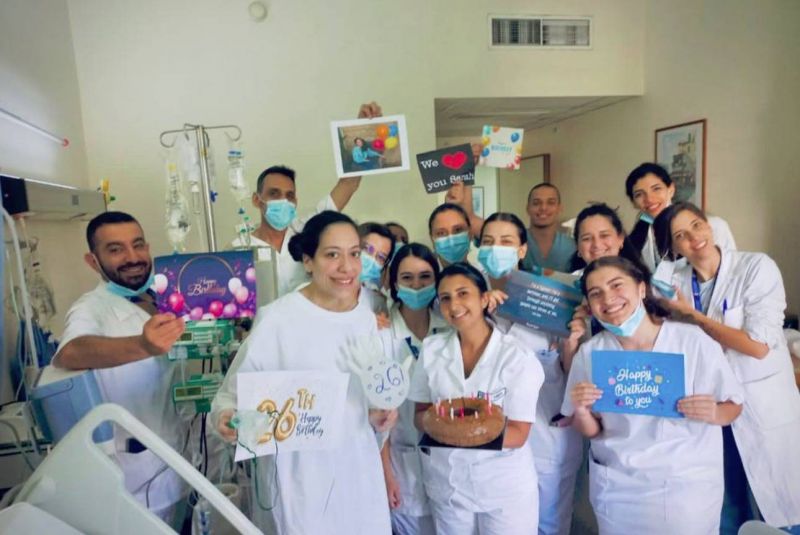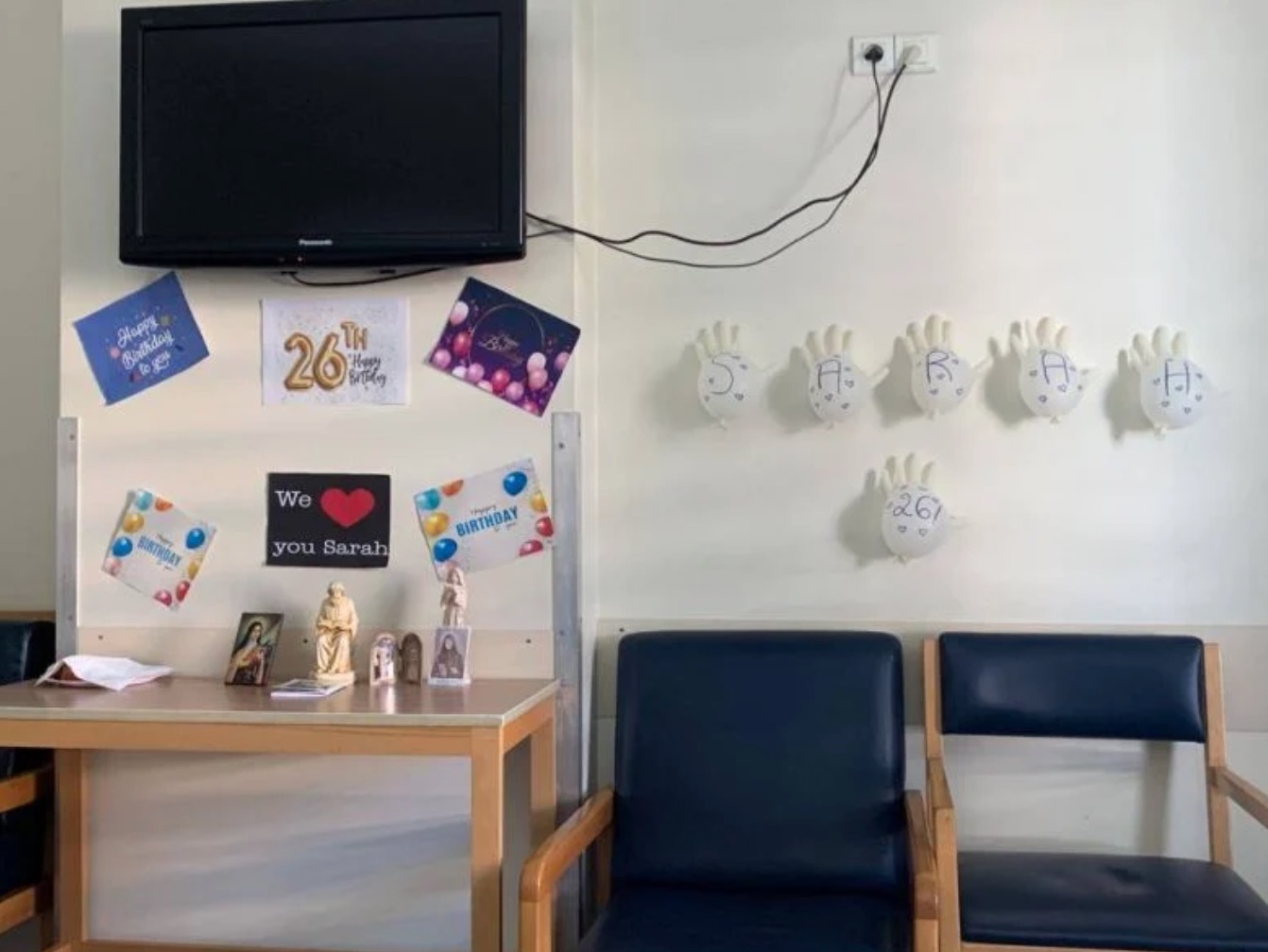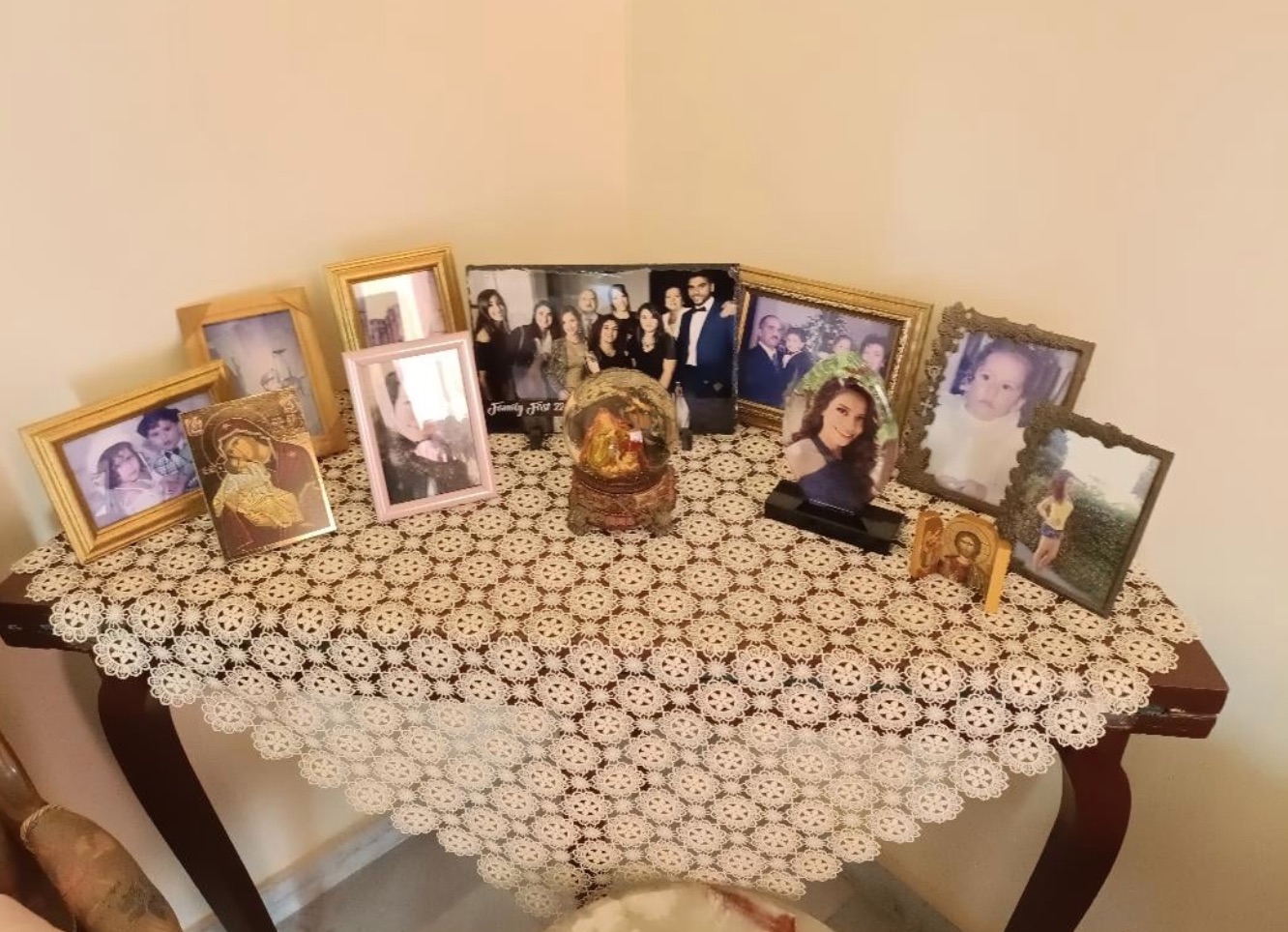
Surrounded by healthcare workers, Sarah el-Haber celebrated her 26th birthday in the hospital. She sadly passed away on Oct. 22, 2023 while awaiting a lung transplant. (Photo courtesy of Sarah el-Haber)
On Viviane al-Haber’s mobile phone, photos of her daughter Sarah tell a vibrant story. Sarah’s face, with its dimples and long brown hair, lights up the screen. Whether dancing the dabké on a bus, savoring a huge hamburger, or joyfully singing with her oxygen mask unplugged in the hospital, Sarah radiates life.
Perhaps it’s because she, more than anyone else, understood that her time was limited.
“She used to say you have to live every moment fully because life is short,” recalls Haber in the family living room.
On the sofa, beside a small glass table holding portraits of Sarah and an icon of the Virgin Mary, the mobile phone occasionally buzzes.
“Her friends keep writing to her as if she were still here.”
On Oct. 22, 2023, Sarah passed away at the age of 26, having awaited a lung transplant that never materialized.
Sarah battled cystic fibrosis, a genetic disease primarily affecting the lungs.
In this condition, thick and sticky mucus progressively obstructs the bronchial tubes, leading to eventual asphyxiation. Sarah’s lungs had essentially transformed into a solid mass resembling concrete.
“We tried our best to prevent her health from declining, but we couldn’t provide the necessary ventilation in intensive care,” explained Zeina Aoun Bacha, Sarah’s pulmonologist. “In Lebanon, cystic fibrosis patients face minimal chances of recovery.”
“Almost none of the essential drugs for these patients are covered,” she added, referring to the list of medications subsidized by the state and the Banque du Liban following Lebanon’s financial collapse in 2019.
 Sarah's hospital room was decorated for her 26th birthday. (Courtesy of Sarah el-Haber)
Sarah's hospital room was decorated for her 26th birthday. (Courtesy of Sarah el-Haber)
For the past two years, Sarah spent much of her time in a room at the Hôtel-Dieu hospital in Beirut, relying on several liters of oxygen.
During the last few months of her life, a machine had become her primary source of breath. Sarah, intimately familiar with her “muco” (cystic fibrosis), created calorie-specific diets for herself, offering guidance to fellow patients and earning the nickname “teacher” from the medical team.
Despite her deteriorating health, Sarah successfully completed her studies, maintaining an unwavering optimism.
In her journal, Sarah outlined her goals for 2023: obtaining a driving license, doing 50 squats daily, reaching a weight of 49 kg, removing the oxygen tube, starting a business, visiting Tyre, Ammiq, and Tripoli, and learning German.
In bold, round letters, she wrote, “Nothing is impossible. Difficult days don’t last. Hard times make you stronger.”
The impact of the economic crisis
At the beginning of 2023, Sarah began Kaftrio, a groundbreaking but costly treatment for cystic fibrosis, funded through a crowdfunding campaign. Unfortunately, it proved ineffective for her specific genetic mutation.
By June, Sarah came to the realization that a transplant was her only chance for survival. However, since 2020, performing such operations in Lebanon has become unfeasible.
Surgeon Jamil Borgi, with extensive experience in the United States, initiated a short-lived lung transplant program at the American Hospital in Beirut in 2018.
After two successful operations, the program came to a halt.
“Maintaining such a program with only a few donors a year was very challenging,” Borgi said. “The numbers remained too low, partly due to cultural and religious hesitations, despite religious endorsements for organ donation.”
“Establishing such a program also requires a network of coordinated professionals: immunologists, pharmacists, psychologists, etc. Due to the crisis, many specialists have left Lebanon,”Borgi added, who himself relocated to New York in 2021.
Transplants of vital organs, such as lungs or hearts, hinge on brain-dead donors, a rarity in Lebanon. In the past four years, amid the challenges of the coronavirus and economic crisis, only two lungs and two hearts have been transplanted in the country.
Georges Teddy, a cardiac surgeon, and heart transplant recipient at Mont-Liban Hospital, highlights the potential.
“Lebanon could potentially have 14 deceased donors per million inhabitants per year,” he said. “I place patients on the waiting list, aware that less than 10 percent will receive transplants.”
“Organ donations could save dozens of patients every year,” Teddy said.
According to the National Committee for Organ and Tissue Donation and Transplantation in Lebanon (NOD-Lb), there is a positive shift in public acceptance.
“The rate of consent to organ donation after death has increased from 9.75 percent in 2010 to 37.5 percent in 2019,” said Farida Younan, coordinator of NOD-Lb.
 Sarah's pictures decorate the family home. (Credit: Thomas Abgral/L'Orient Today)
Sarah's pictures decorate the family home. (Credit: Thomas Abgral/L'Orient Today)
The drop in donor numbers is mainly due to the economic crisis.
After confirming brain death, organs need to be kept working for 48 to 72 hours before removal.
“Before the crisis, the Healthy Ministry covered 80 percent of resuscitation costs, with NOD-Lb funding the rest,” said Moussa Riachy, head of the resuscitation unit at Hôtel-Dieu Hospital. “We’re talking about a total sum of between $4,000 and $5,000.”
However, since the crisis, the state has completely withdrawn its support, and NOD-Lb now faces a severe budget shortfall.
The organization’s annual funding, which used to be $300,000, has been entirely depleted due to devaluation. As a result, the current budget is a mere $3,000 per year.
“This amount barely covers the generator’s costs, even as we continue to gather funds from various countries to revive the national donation program,” said Younan.
The only horizon is abroad
NOD-Lb’s national waiting list includes about 700 patients in need of various organs, with approximately 60 awaiting a new heart, including Rasha Issa.
At 36 years old, Issa, a mother of one, grapples with severe heart failure.
Recently hospitalized for a blood transfusion and a replacement of the cable connected to her heart pump (LVAD - Left Ventricular Assist Device) due to a recurring infection, Issa’s temporary device, implanted in 2014, typically lasts four to five years, serving as a support to the heart while awaiting a transplant. However, her condition continues to worsen day by day.
“I feel that God still has a purpose for me, but I’m uncertain about what it is,” Issa said, each word requiring considerable effort. The daily life of this mother of three children, aged 15, 13, and 9, has turned into an ordeal.
“I can’t climb stairs anymore; even moving from one room to another exhausts me,” she said. “I don’t want to reveal to my children how challenging it has become, so I hide to cry when they’re not around.”
For more than a year, doctors have been emphasizing the urgency of a transplant for this patient, who is fervently seeking a solution abroad. It’s become a genuine obstacle course.
In the United States, a lung or heart transplant typically costs between $800,000 and one million dollars. In Europe, the cost ranges from 150,000 to 300,000 euros, but there is now less flexibility and organ donations remain more of an exception than the rule, with priority given to patients within the country.
In India, heart transplants are available for approximately $100,000, although safety concerns are imminent.
Issa reached out to a hospital in France a few months ago, where several Lebanese patients have previously undergone transplants, though, as of now, without success.
Similarly, Sarah al-Haber had also initiated the process in France, with the assistance of the Grégory Lemarchal Association.
A renowned hospital in the Paris suburbs had agreed to treat her, and although the French authorities had tentatively approved her visa application, a final decision was still pending. Unfortunately, time ran out for Sarah.
Meanwhile, Issa finds herself in a desperate race against time, and the looming specter of death adds urgency to her pursuit.
This article was originally published in French in L'Orient-Le Jour. Translation by Sahar Ghoussoub.